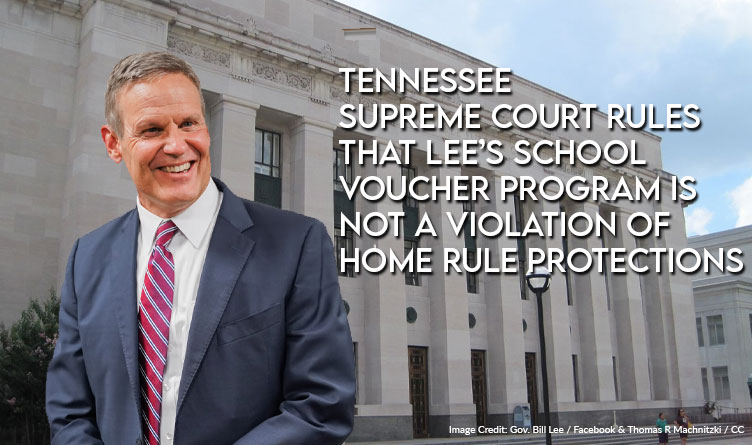Image Credit: Gov. Bill Lee / Facebook & Thomas R Machnitzki / CC
The Tennessee Conservative [By Jason Vaughn] –
The Tennessee Supreme Court has overturned the decisions of lower courts and has found that Governor Lee’s school voucher program is, in fact, not a violation of home rule protections.
Opponents of the program have said that it is a violation of those protections because it only affects Davidson and Shelby Counties.
The program was passed by a slim majority three years ago. A decision was finally made in the Supreme Court case after the court opted to rehear arguments after dealing with last year’s death of Justice Connie Clark.
They released their 3-2 decision on Thursday; Chief Justice Roger Page and Justice Jeff Bivens voted that it was not a violation, along with Court of Appeals Judge Skip Frierson, who was sitting in on the case. Justices Sharon Lee and Holly Kirby dissented.
The decision overturned rulings by a Davidson County chancellor and the Tennessee Court of Appeals.
The court agreed with lower courts that Metro Nashville Council and Shelby County had standing to bring their claim but held that the education savings account program is not “unconstitutional” based on the Home Rule Amendment, which requires that local governments be allowed to vote or hold referendums on legislative action that applies to only one or two counties statewide.
In response to the decision, Governor Lee tweeted, “Every child deserves a high-quality education, and today’s Tennessee Supreme Court opinion on ESAs puts parents in Memphis and Nashville one step closer to finding the best education fit for their children.”
Lt. Governor Randy McNally said in a statement, “It is critically important parents have as many choices as possible in educating their children. I am confident the state will continue winning in the courts on this legislation and that parents and students will soon be able to access this much-needed program.”
The program was aimed at allowing low-income students in low-performing schools in Davidson and Shelby counties to use vouchers to attend a school of their choice. Those students were set to receive approximately $7,000 to choose their school even though, at that point, schools in Shelby County spent $13,000 per student each year and Nashville schools spent $16,000 per student.
*** Click Here to Support Conservative Journalism in Tennessee. We can’t cover stories like this without your support!***
The Senate Democratic Caucus blasted the Supreme Court’s decision in a statement.
“Private school vouchers, paid for with public school tax dollars, do not work and this scheme has failed students every place it has been tried. In this decision, the Supreme Court erased constitutional protections for local control and years of precedent Not only does this decision usher in a terrible education policy, but it invites more political meddling that surely results in local governments losing freedom and independence from state interference,” the statement said.
Tennessee Attorney General Herbert Slatery’s statement on the said that the court’s decision was a “major step forward” but warned there are still more court proceedings ahead.
“The Education Savings Account program has always been about helping Tennessee students — giving eligible families a choice in education, an opportunity they currently do not have. It challenged the status quo — a move that is always met with resistance. We applaud the Court’s decision that this pilot program is indeed constitutional,” Slatery said.
The Beacon Center of Tennessee also applauded the decision in a statement from President and CEO Justin Owen.
“We are so pleased that the Tennessee Supreme Court affirmed today what we have always known: The ESA law is not a violation of the Tennessee Constitution’s Home Rule Amendment. We are fully confident after this decision that families in Nashville and Memphis will finally get the choice opportunities that they deserve,” Owen said.
Tennessee State Director for the American Federation for Children, John Patton, also hailed the decision in a statement.
“The Tennessee Supreme Court made the right decision today by declaring that the Education Savings Account program does not violate the home rule amendment.
“We are heartened by the decision and look forward to the next steps for the program. School choice programs work. They empower parents with the resources to find schools that better fit their unique needs and they foster innovation.
“These programs encourage both private and public schools to create new and better options for all students. At the American Federation for Children, we remain focused on students, not systems, and we will always advocate to empower families to make the best decision for their kids.”
Following is a release from the Administrative Office of the Courts:
In an opinion released today, the Tennessee Supreme Court determined that, while two Tennessee county governments had standing to challenge the Education Savings Account Pilot Program (the “ESA Act”), the Act is not rendered unconstitutional by the Home Rule Amendment, article XI, section 9, of the Tennessee Constitution.
In 2019, the Tennessee General Assembly enacted ESA Act. The Act establishes a program allowing a limited number of eligible students to directly receive their share of state and local education funds, which would ordinarily be provided to the public school system they attend, to pay for a private school education and associated expenses.
The Metropolitan Government of Nashville and Davidson County, Shelby County Government, and Metropolitan Nashville Board of Public Education filed a declaratory judgment action that named as defendants Governor Bill Lee, the Tennessee Department of Education Commissioner, and the Tennessee Department of Education. The trial court also allowed additional parties to intervene and participate as defendants. The complaint alleged that the ESA Act violates several provisions of the Tennessee Constitution, including the Home Rule Amendment, the equal protection clauses, and the education clause.
Defendants filed separate motions challenging Plaintiffs’ standing to pursue the claims presented and the legal sufficiency of those claims. Plaintiffs, in turn, filed a motion for summary judgment with respect to their Home Rule Amendment claim. The trial court determined that the two county plaintiffs had standing to pursue the claims, but it dismissed the Metro School Board as a plaintiff for lack of standing. The trial court also granted the motion for summary judgment concluding that the ESA Act violates the Home Rule Amendment and enjoined the State from implementing the Act. The trial court reserved ruling on Defendants’ challenges to the equal protection and education clause claims.
The trial court granted Defendants permission to seek an interlocutory appeal, and the Court of Appeals granted Defendants’ applications for appeal. The intermediate appellate court affirmed the trial court, holding that Metro and Shelby County had standing to challenge the ESA Act under the Home Rule Amendment and that the Act was unconstitutional pursuant to the Home Rule Amendment.
The Tennessee Supreme Court granted Defendants’ applications for permission to appeal. Because it is an interlocutory appeal, the issues before the Court were limited to the constitutionality of the ESA Act under the Home Rule Amendment and Plaintiffs’ standing to bring that challenge. The Supreme Court agreed with both the trial court and the Court of Appeals that Plaintiffs Metro and Shelby County had standing to bring their Home Rule Amendment Claim. However, the Supreme Court, after reviewing the applicable constitutional language, held that the ESA Act is not rendered unconstitutional by the Home Rule Amendment because the Act is not “applicable to” the Plaintiff counties for purposes of the Amendment. The majority concluded that the ESA Act is not applicable to the Plaintiff counties because the Act regulates or governs the conduct of the local education agencies and not the counties. Thus, the Act does not violate the Home Rule Amendment. The Supreme Court therefore affirmed, in part, and reversed, in part, the judgment of the Court of Appeals and remanded the case to the trial court for the dismissal of the Home Rule Amendment claim and for consideration of Plaintiffs’ remaining claims.
Justice Sharon G. Lee and Justice Holly Kirby joined in a separate opinion, concurring in part and dissenting in part. They agreed with the Court that Metro and Shelby County had standing to challenge the ESA Act but concluded that the Act violates the Home Rule Amendment. In their view, the ESA Act substantially affects Metro and Shelby County’s ability to self-govern and decide school funding issues. Under the ESA Act, only Metro and Shelby County and no other counties in the state must pay for students who leave public schools and use their vouchers for private school tuition. Because the ESA Act is local in effect and application, and because the Act gives Metro and Shelby County no choice in the matter, it violates the Home Rule Amendment.
To read the majority opinion in Metropolitan Government of Nashville and Davidson County, et al. v. Tennessee Department of Education, et al., authored by Chief Justice Roger A. Page, and the separate opinion authored by Justice Sharon G. Lee, visit the opinions section of TNCourts.gov.

About the Author: Jason Vaughn, Media Coordinator for The Tennessee Conservative ~ Jason previously worked for a legacy publishing company based in Crossville, TN in a variety of roles through his career. Most recently, he served as Deputy Director for their flagship publication. Prior, he was a freelance journalist writing articles that appeared in the Herald Citizen, the Crossville Chronicle and The Oracle among others. He graduated from Tennessee Technological University with a Bachelor’s in English-Journalism, with minors in Broadcast Journalism and History. Contact Jason at news@TennesseeConservativeNews.com





One Response
Davidson and Shelby County’s are the absolute proof that the money spent per student has no bearing on the quality of their education. The more “Woke” these administrators and teachers get, the more the students go to sleep or just don’t show up. Instead of talking about how much they spend per capita, their arguments would be far more meaningful if they stop talking and starting doing. I strongly support the voucher system, wish it was better funded. The old adage, “if you can’t stand the heat, stay out of the fire”, applies. Either do a better job of educating or don’t cry because your toys are taken away.